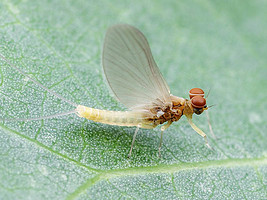Ephemeroptera
Mayflies
- Schistonota
- Baetoidea
- Siphlonuridae
- Baetidae
- Oniscigastridae
- Ameletopsidae
- Ametropodidae
- Heptagenioidea
- Coloburiscidae
- Oligoneuriidae
- Isonychiidae
- Heptageniidae
- Leptophlebioidea
- Leptophlebiidae
- Ephemeroidea
- Behningiidae
- Potamanthidae
- Euthyplociidae
- Polymitarcydae
- Ephemeridae
- Palingeniidae
- Baetoidea
- Pannota
- Ephemerelloidea
- Ephemerellidae
- Leptohyphidae
- Tricorythidae
- Caenoidea
- Neoephemeridae
- Baetiscidae
- Caenidae
- Prosopistomatidae
- Ephemerelloidea
Introduction
Adults do not eat. Immatures are aquatic, feeding on diatoms, algae, or are carnivores.Carboniferous to Recent.
Ephemeros - short-lived, pteron - wing, referring to the short life span of adults.
Characteristics
Derived characteristics:- Fore legs of male elongated, used to grasp female in flight.
- mouthparts of adults reduced, unsclerotised.
- hind wings reduced, smaller than fore wings.
References
Bae, Y. J. and W. P. McCafferty. 1991. Phylogenetic systematics of the Potamanthidae (Ephemeroptera). Transactions of the American Entomological Society 117(3-4):1-144.
Bae, Y. J. and W. P. McCafferty. 1998. Phylogenetic systematics and biogeography of the Neoephemeridae (Ephemeroptera: Pannota). Aquatic Insects 20(1):35-68.
Dominguez, E. and M. G. Cuezzo. 2002. Ephemeroptera egg chorion characters: A test of their importance in assessing phylogenetic relationships. Journal of Morphology 253(2):148-165.
Edmunds, G. F. and W. P. McCafferty. 1988. The mayfly subimago. Annual Review of Entomology 33:509-529.
Gereben-Krenn, B. A. and G. Pass. 2000. Circulatory organs of abdominal appendages in primitive insects (Hexapoda: Archaeognatha, Zygentoma and Ephemeroptera). Acta Zoologica 81(4):285-292.
Harker, J. E. 1999. The structure of the foregut and midgut of nymphs, subimagos and imagos of Cloeon dipterum (Ephemeroptera) and the functions of the gut of adult mayflies. Journal of Zoology 248:243-253.
Lugo-Ortiz, C. R. and W. P. McCafferty. 1998. A new North American genus of Baetidae (Ephemeroptera) and key to Baetis complex genera. Entomological News 109(5):345-353.
McCafferty, W. P. 1987. New fossil mayfly in amber and its relationships among extant Ephemeridae (Ephemeroptera). Annals of the Entomological Society of America 80(4):472-474.
McCafferty, W. P. 1990. Ephemeroptera. Bulletin of the American Museum of Natural History 0(195):20-50.
McCafferty, W. P. 1991. Toward a phylogenetic classification of the Ephemeroptera (Insecta) - A commentary on systematics. Annals of the Entomological Society of America 84(4):343-360.
McCafferty, W. P. 1996. The Ephemeroptera species of North America and index to their complete nomenclature. Transactions of the American Entomological Society 122 (1):1-54.
McCafferty, W. P. and R. D. Waltz. 1990. Revisionary synopsis of the Baetidae (Ephemeroptera) of North and Middle America. Transactions of the American Entomological Society 116(4):769-800.
McCafferty, W. P. and T. Q. Wang. 2000. Phylogenetic systematics of the major lineages of pannote mayflies (Ephemeroptera: Pannota). Transactions of the American Entomological Society 126(1):9-101.
Ogden, T. H. and M. F. Whiting. 2005. Phylogeny of Ephemeroptera (mayflies) based on molecular evidence. Molecular Phylogenetic and Evolution 37(3):625-643.
Pescador, M. L. and W. L. Peters. 1986. Revision of the genera Meridialaris and Massartellopsis (Ephemeroptera: Leptophlebiidae: Atalophlebiinae) from South America. Transactions of the American Entomological Society 112(3):147-190.
Pescador, M. L. and W. L. Peters. 1991. Biosystematics of the genus Penaphlebia (Ephemeroptera: Leptophlebiidae: Atalophlebiinae) from South America. Transactions of the American Entomological Society 117(1-2):1-38.
Peters, W. L. and I. C. Campbell. 1991. Ephemeroptera. Pages 279-293 in Insects of Australia: A Textbook for Students and Research Workers. Volume I. Second Edition. I. D. Naumann, P. B. Carne, J. F. Lawrence, E. S. Nielsen, J. P. Spradberry, R. W. Taylor, M. J. Whitten and M. J. Littlejohn eds. Carlton, Victoria, Melbourne University Press.
Ruffieux, L., J. M. Elouard, and M. Sartori. 1998. Flightlessness in mayflies and its relevance to hypotheses on the origin of insect flight. Proceedings of the Royal Society of London Series B 265(1410):2135-2140.
Savage, H. M. 1987. Biogeographic classification of the Neotropical Leptophlebiidae (Ephemeroptera) based upon geological centers of ancestral origin and ecology. Studies on Neotropical Fauna and Environment 22(4):199-222.
Savolainen, E., A. Saura, and J. Hantula. 1993. Mode of swarming in relation to reproductive isolation in mayflies. Evolution 47(6):1796-1804.
Soldan, T. 1982. A revision of the Caenidae with ocellar tubercles in the nymphal stage (Ephemeroptera). Acta Universitatis Carolinae Biologica (5-6):289-362.
Staniczek, A. H. 2000. The mandible of silverfish (Insecta: Zygentoma) and mayflies (Ephemeroptera): Its morphology and phylogenetic significance. Zoologischer Anzeiger 239(2):147-178.
Wang, T. Q. and W. P. McCafferty. 1995. Relationships of the Arthropleidae, Heptageniidae, and Pseudironidae (Ephemeroptera: Heptagenioidea). Entomological News 106(5):251-256.
Wang, T. Q., W. P. McCafferty, and Y. J. Bac. 1997. Sister relationship of the Neoephemeridae and Caenidae (Ephemeroptera: Pannota). Entomological News 108(1):52-56.
Wang, T. Q. and W. P. McCafferty. 2004. Heptageniidae (Ephemeroptera) of the world. Part I: Phylogenetic higher classification. Transactions of the American Entomological Society, 130 (1): 11-45.
Information on the Internet
- Mayfly Central. Purdue University.
- EphemeropteraGalactica. Florida A&M University.
- Mayflies of the United States. Coordinated by Boris C. Kondratieff. USGS Northern Prairie Wildlife Research Center.
- Ephemeroptera Germanica. Arne Haybach, Mainz.
- Ephémères de France. Gérard Masselot.
- The Mayflies (Ephemeroptera) of South Africa. Compiled by Helen Barber-James.
- Ephemeroptera Types in the Former USSR.
Title Illustrations

| Scientific Name | Hexagenia sp. |
|---|---|
| Location | Kansas City, Kansas, USA |
| Comments | Yellow Drake Mayfly |
| Specimen Condition | Live Specimen |
| Copyright |
© 2003 Alex Wild

|
| Scientific Name | Ephemeroptera |
|---|---|
| Location | Washoe Co., Nevada, U.S.A. |
| Specimen Condition | Live Specimen |
| Life Cycle Stage | Adult |
| Copyright |
© 2004 Alex Wild

|
About This Page
Page copyright © 2002
All Rights Reserved.
Citing this page:
Tree of Life Web Project. 2002. Ephemeroptera. Mayflies. Version 01 January 2002 (temporary). http://tolweb.org/Ephemeroptera/8265/2002.01.01 in The Tree of Life Web Project, http://tolweb.org/








 Go to quick links
Go to quick search
Go to navigation for this section of the ToL site
Go to detailed links for the ToL site
Go to quick links
Go to quick search
Go to navigation for this section of the ToL site
Go to detailed links for the ToL site